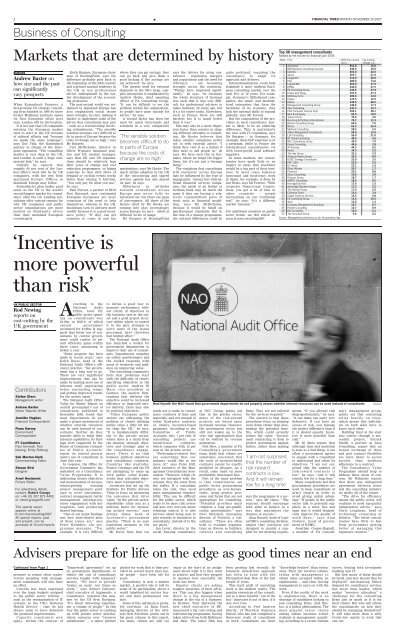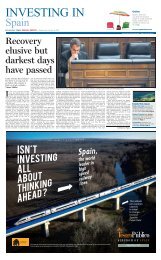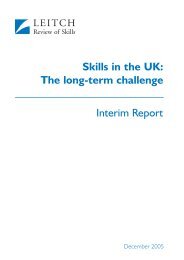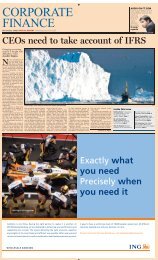What are consultants for? - Financial Times - FT.com
What are consultants for? - Financial Times - FT.com
What are consultants for? - Financial Times - FT.com
You also want an ePaper? Increase the reach of your titles
YUMPU automatically turns print PDFs into web optimized ePapers that Google loves.
2 ★ FINANCIALTIMESMONDAYNOVEMBER 19 2007<br />
Business of Consulting<br />
Markets that <strong>are</strong> determined by history<br />
EUROPE<br />
Andrew Baxter on<br />
how size and the past<br />
can significantly<br />
vary prospects<br />
When Katzenbach Partners, a<br />
fast-growing US strategy consulting<br />
firm founded in 1998 by three<br />
<strong>for</strong>mer McKinsey partners, opens<br />
its first European office next<br />
year, London will be the location.<br />
It is not just that US <strong>com</strong>panies<br />
entering the European market<br />
tend to start in the UK because<br />
of cultural affinity and “because<br />
we speak the same language”,<br />
says Gus Vlak, the Katzenbach<br />
partner in charge of the European<br />
expansion. “The consulting<br />
market is very deep in the UK,<br />
and London is such a huge <strong>com</strong>mercial<br />
hub,” he says.<br />
Initially he expects that<br />
roughly 60 per cent of the London<br />
office’s work will be <strong>for</strong> UK<br />
<strong>com</strong>panies, with the rest from<br />
mainland Europe. Offices in<br />
mainland Europe may follow.<br />
Katzenbach’s plan makes good<br />
sense as the UK is the world’s<br />
second-biggest market <strong>for</strong> consultancy<br />
after the US. Leading <strong>consultants</strong><br />
offer various reasons <strong>for</strong><br />
why UK <strong>com</strong>panies and public<br />
sector organisations <strong>are</strong> more<br />
hooked on third-party advice<br />
than their mainland European<br />
counterparts.<br />
Contributors<br />
Stefan Stern<br />
Management writer<br />
Andrew Baxter<br />
Senior Reports Writer<br />
Jennifer Hughes<br />
<strong>Financial</strong> Correspondent<br />
Fiona Harvey<br />
Environment<br />
Correspondent<br />
<strong>FT</strong> Contributors<br />
Paul Gronwall, Rod<br />
Newing, Emily Rotberg<br />
Seb MortonClark<br />
Commissioning Editor<br />
Steven Bird<br />
Designer<br />
Arnel Hecimovic<br />
Picture Editor<br />
For advertising details,<br />
contact: Robert Grange<br />
on: +44 (0) 207 873 4418;<br />
or robert.grange@ft.<strong>com</strong><br />
This special report<br />
appears online at<br />
ft.<strong>com</strong>/bizconsulting2007.<br />
All special reports, past<br />
and present, can be<br />
accessed at ft.<strong>com</strong>/reports<br />
Keith Burgess, European chairman<br />
of BearingPoint, says the<br />
difference probably goes back to<br />
the beginning of the 20th century<br />
and a greater natural tendency in<br />
the UK to use professional<br />
advice, underpinned by the earlier<br />
development of the accounting<br />
profession.<br />
The post-second world war settlement<br />
in mainland Europe has<br />
also emphasised social issues<br />
more strongly, he says, making it<br />
harder to implement some of the<br />
advice that <strong>consultants</strong> may give<br />
– such as a restructuring involving<br />
redundancies. “The sensible<br />
solution be<strong>com</strong>es very difficult to<br />
do in parts of Europe because the<br />
costs of change <strong>are</strong> so high,” says<br />
Mr Burgess.<br />
Carl McNicholas, director in<br />
Oliver Wyman’s insurance practice<br />
and UK market manager,<br />
says that UK and US organisations<br />
should be relatively lean<br />
after years of change and cost<br />
reduction programmes, so hiring<br />
expertise to deal with flows of<br />
demand or cyclical events works<br />
better than owning it full-time.<br />
“You only pay <strong>for</strong> what you use,”<br />
he says.<br />
Paul Forrest, a partner at BDO<br />
Stoy Hayward, says continental<br />
European businesses <strong>are</strong> more<br />
conscious of the need to help<br />
themselves, whereas in the UK,<br />
businesses turn to advisers more<br />
readily because it is a good insurance<br />
policy. “If they can get<br />
someone to <strong>com</strong>e in and say<br />
‘Incentive is<br />
more powerful<br />
than risk’<br />
UKPUBLICSECTOR<br />
Rod Newing<br />
reports on<br />
costcutting by the<br />
UK government<br />
where they can get savings, they<br />
can go back and give them a<br />
good kicking if the savings <strong>are</strong><br />
not achieved,” he says.<br />
The greater need <strong>for</strong> external<br />
diagnosis in the UK’s large, <strong>com</strong>plex<br />
enterprises is emphasised by<br />
Andrew Hooke, chief operating<br />
officer of PA Consulting Group.<br />
“It can be difficult to see the<br />
problem within the organisation,<br />
so people have gone outside <strong>for</strong><br />
advice,” he says.<br />
A second factor has been the<br />
need <strong>for</strong> quick turnrounds and<br />
solutions in a very <strong>com</strong>petitive<br />
‘The sensible solution<br />
be<strong>com</strong>es difficult to do<br />
in parts of Europe<br />
because the costs of<br />
change <strong>are</strong> so high’<br />
marketplace, says Mr Hooke. The<br />
much earlier adoption in the UK<br />
of the outsourcing and sh<strong>are</strong>d<br />
services agenda has also played<br />
its part, he says.<br />
Differences in attitudes<br />
towards <strong>consultants</strong> across<br />
Europe may never fully be<br />
smoothed out, but there <strong>are</strong> signs<br />
of convergence. All three of the<br />
factors cited by Mr Hooke <strong>are</strong><br />
<strong>com</strong>ing into play increasingly<br />
across Europe, he says – albeit at<br />
different levels of usage.<br />
Mr Burgess at BearingPoint<br />
says the drivers <strong>for</strong> using <strong>consultants</strong><br />
– regulation, mergers<br />
and acquisitions and the need <strong>for</strong><br />
efficiency – <strong>are</strong> be<strong>com</strong>ing<br />
stronger across the continent.<br />
“Things have improved significantly,”<br />
he says. “In Germany<br />
the whole structure of business<br />
was such that it was very difficult<br />
<strong>for</strong> professional advisers to<br />
make headway 20 years ago, but<br />
it’s a lot easier today. Elsewhere,<br />
such as France, there <strong>are</strong> still<br />
barriers but it is much better<br />
than it was.”<br />
Size may also be a more important<br />
factor than country in shaping<br />
different attitudes to consulting.<br />
Mr Hooke believes that<br />
many smaller <strong>com</strong>panies prefer<br />
not to seek external advice. “I<br />
think they view it as a failure if<br />
they have to call people in,” he<br />
says. We have seen this in Germany,<br />
where we target the bigger<br />
firms, but it’s not just a German<br />
thing.”<br />
The variations that <strong>consultants</strong><br />
still encounter across Europe<br />
may be influenced by the type of<br />
engagement. Among less international<br />
financial services <strong>com</strong>panies,<br />
the needs of an Italian or<br />
German bank may be much the<br />
same if they <strong>are</strong> buying a relatively<br />
<strong>com</strong>moditised piece of<br />
work such as financial modelling,<br />
says Mr McNicholas,<br />
because it would be based on<br />
pan-European standards. But in<br />
the case of a change programme,<br />
the cultural differences could be<br />
quite profound, requiring the<br />
consultancy to adapt its<br />
approach and delivery.<br />
Internationalisation could help<br />
stimulate a more uni<strong>for</strong>m European<br />
consulting market over the<br />
next five or 10 years. For example,<br />
Germany’s Mittelstand <strong>com</strong>panies,<br />
the small- and mediumsized<br />
enterprises that <strong>for</strong>m the<br />
backbone of its economy, may<br />
lack the internal skills to expand<br />
globally, says Mr Forrest.<br />
But the <strong>com</strong>position of the providers<br />
in each consultancy market<br />
is likely to be an enduring<br />
difference. This is particularly<br />
the case with IT consulting, says<br />
Mr Burgess – in Germany, <strong>for</strong><br />
example, deep SAP expertise is at<br />
a premium, while in France the<br />
international consultancies vie<br />
with lower-priced local softw<strong>are</strong><br />
suppliers.<br />
In some markets, the consultancies<br />
have made little or no<br />
impact in <strong>are</strong>as that elsewhere<br />
would be a big part of their business.<br />
In most cases business<br />
turnround and insolvency work<br />
in Spain, <strong>for</strong> example, is done by<br />
law firms, says Mr Forrest. “With<br />
corporate finance-type transactions,<br />
you get a lot of that in<br />
other countries – people<br />
encroaching on our traditional<br />
turf,” he says. “It’s a different<br />
market dynamic.”<br />
For additional <strong>com</strong>ment on public<br />
sector trends, see this article on<br />
www.ft.<strong>com</strong>/consulting2007<br />
Top UK management <strong>consultants</strong><br />
Ranked by fee in<strong>com</strong>e <strong>for</strong> fi nancial year 2006<br />
Rank Firm 2006 Fee in<strong>com</strong>e Fee in<strong>com</strong>e<br />
(£m)<br />
change (£)<br />
1 Accenture 851.8 16.8<br />
2 IBM Business Consulting Services 649.0 39.0<br />
3 Deloitte 403.0 42.0<br />
4 Xansa 397.7 27.9<br />
5 Capgemini 319.0 28.0<br />
6 PwC 289.0 73.0<br />
7 LogicaCMG 263.0 27.0<br />
8 KPMG 242.6 27.5<br />
9 PA Consulting Group 230.5 27.9<br />
10 Ernest and Young 197.9 27.3<br />
11 McKinsey & Co 185.0 13.0<br />
12 Fujitsu 172.5 12.5<br />
13 Detica 149.5 48.2<br />
14 Management Consulting Group 146.9 17.3<br />
15 Atos Consulting 141.3 12.7<br />
16 CSG Computer Science Corp 102.1 28.1<br />
17 Bain & Company 82.0 10.0<br />
18 Towers Perrin 78.0 4.0<br />
19 Ove Arup & Partners International 76.7 11.5<br />
20 Boston Consulting Group 64.0 7.0<br />
21 Morse 63.3 22.4<br />
22 Methods Consulting 58.5 5.5<br />
23 Atkins Management Consultants 58.0 13.0<br />
24 LEK Consulting 56.0 21.0<br />
25 BT Global Consulting 48.5 4.5<br />
26 REL Consultancy Group 45.9 7.9<br />
27 Penna Consulting 44.6 2.8<br />
28 AT Kearney 44.5 5.5<br />
29 Hedra 34.3 2.5<br />
30 The Hay Group 33.2 2.9<br />
31 Analysys Mason Group 32.5 -0.9<br />
32 OC&C Strategy Consultants 25.0 3.5<br />
33 PKF (UK) 23.0 2.5<br />
34 EC Harris 22.1 1.6<br />
35 Oliver Wyman 20.7 1.7<br />
36 Charteris 20.1 0.8<br />
37 Serco Consulting 19.0 3.9<br />
38 Chaucer Group 18.7 1.7<br />
39 AMTEC Consulting 18.5 0.5<br />
40 Hornagold & Hills 17.6 1.6<br />
41 Advantage Business Group 17.5 2.2<br />
42 The Nichols Group 17.0 2.6<br />
43 Collinson Grant 15.4 3.4<br />
44 Capita Advisory Services 14.5 4.8<br />
45 EA Consulting Group 13.4 10.2<br />
46 Axon 12.0 1.2<br />
47 Compass Management Consulting 10.7 0.7<br />
48 Hitachi Consulting 10.7 0.9<br />
49 Dbi Consulting 10.5 -3.1<br />
50 The Structure Group 9.6 2.5<br />
Source: Managementconsultancy.co.uk; Accountancy Age<br />
Advisers prep<strong>are</strong> <strong>for</strong> life on the edge as good times near an end<br />
Continued from Page 1<br />
pressure to reduce often controversial<br />
spending with management<br />
<strong>consultants</strong> will also have<br />
an effect.<br />
Concern has been expressed<br />
over the large budgets assigned<br />
to big public sector re<strong>for</strong>ms –<br />
such as the reorganisation of IT<br />
systems in the UK’s National<br />
Health Service – that do not<br />
always seem to have delivered<br />
the promised improvements.<br />
Capacity constraints now<br />
apply, within the context of<br />
According to the<br />
National Audit<br />
Office, total UK<br />
public sector spending<br />
on <strong>consultants</strong> was<br />
£2.8bn in 2005-6, of which<br />
central government<br />
accounted <strong>for</strong> £1.8bn. It suggests<br />
that better use of <strong>consultants</strong><br />
by central government<br />
could realise 30 per<br />
cent efficiency gains within<br />
three years, amounting to<br />
£540m a year.<br />
“Some progress has been<br />
made in recent years,” says<br />
Keith Davis, head of the<br />
National Audit Office’s efficiency<br />
practice, “but government<br />
has a long way to go.<br />
There <strong>are</strong> very significant<br />
improvements that can be<br />
made by making more use of<br />
inhouse staff; negotiating<br />
better contracting terms;<br />
and getting improved results<br />
<strong>for</strong> the money spent.”<br />
The National Audit Office<br />
Value <strong>for</strong> Money Report on<br />
central government’s use of<br />
<strong>consultants</strong>, published in<br />
December 2006, found that<br />
most departments do not<br />
make a proper assessment of<br />
whether internal resources<br />
can be used instead of <strong>consultants</strong>.<br />
Neither do they<br />
transfer skills to build their<br />
internal capabilities. Its findings<br />
were supported by the<br />
House of Commons Committee<br />
of Public Accounts’<br />
report on central government’s<br />
use of <strong>consultants</strong> in<br />
June this year.<br />
In response, the Office <strong>for</strong><br />
Government Commerce has<br />
embarked on a Consultancy<br />
Value Programme. It is<br />
addressing cle<strong>are</strong>r objectives<br />
and measurement of success,<br />
reinterpreting existing<br />
project management guidance<br />
to cover consultancy,<br />
contract management, better<br />
management in<strong>for</strong>mation,<br />
closer engagement with key<br />
suppliers, and promoting<br />
sh<strong>are</strong>d learning.<br />
“One of our major findings<br />
was how inter-related most<br />
of these issues <strong>are</strong>,” says<br />
Peter Walmsley, the programme<br />
manager. “For<br />
example, it is very difficult<br />
“framework agreements” set up<br />
by government departments, to<br />
reduce the cost of consultancy<br />
services bought with taxpayers’<br />
money. “We have to provide<br />
‘brains on seats’, not ‘bums on<br />
seats’,” says Robert Osborne,<br />
chief executive of Augmentis, a<br />
consultancy, acquired this summer<br />
by the US firm Navigant.<br />
“It’s about delivering expertise,<br />
not a volume of people.” In this<br />
way the public sector is catching<br />
up with private sector practice,<br />
where concerns over “resource<br />
substitution” – a senior partner<br />
to define a good way to<br />
measure per<strong>for</strong>mance without<br />
clarity of objectives in<br />
the business case at the outset<br />
and a good project structure<br />
within which to control<br />
it. In the past, attempts to<br />
solve some of the issues<br />
piecemeal have there<strong>for</strong>e<br />
had limited effect.”<br />
The National Audit Office<br />
has launched a toolkit <strong>for</strong><br />
government departments to<br />
improve their use of <strong>consultants</strong>.<br />
Departments <strong>com</strong>plete<br />
an online questionnaire and<br />
the toolkit responds with<br />
<strong>are</strong>as of weakness and guidance<br />
on improving value.<br />
The consulting <strong>com</strong>munity<br />
feels that problems start<br />
with the difficulty of clearly<br />
specifying objectives in the<br />
public sector. Andrea Di<br />
Maio, vice president at<br />
Gartner, the analyst firm,<br />
explains that whereas the<br />
objective could be increased<br />
efficiency or improved service<br />
delivery, there may also<br />
be political objectives.<br />
“Other European public<br />
sectors <strong>are</strong> addressing the<br />
problem of clearly defining<br />
public value a little bit better<br />
than the UK,” he says.<br />
“It is fundamentally different<br />
to the private sector,<br />
where there is a chain from<br />
the mission, strategic objectives<br />
and strategic plan to<br />
the consultancy engagement.<br />
There is no link<br />
between political objectives<br />
and consultancy contracts.<br />
Countries like Australia,<br />
France, Germany and the US<br />
<strong>are</strong> attempting to <strong>com</strong>e up<br />
with public value frameworks<br />
that articulate objectives<br />
more transp<strong>are</strong>ntly.”<br />
Accenture has set up the<br />
Institute <strong>for</strong> Public Service<br />
Value to focus on measuring<br />
the out<strong>com</strong>es that drive<br />
value. “In the private sector,<br />
sh<strong>are</strong>holder value acts as a<br />
unifying factor <strong>for</strong> measuring<br />
project success,” says<br />
Jeremy Oates, head of<br />
Accenture’s government<br />
practice. “There is no easy<br />
equivalent measure in the<br />
public sector.”<br />
Mr Davis feels that too<br />
pitches <strong>for</strong> work that is then provided<br />
by several much more junior<br />
people – have been rife <strong>for</strong><br />
years.<br />
Consultancy is now a mature<br />
market. A positive tale is told by<br />
some of its participants, about a<br />
world inhabited by savvier buyers<br />
and more professional vendors.<br />
Some of this optimism is probably<br />
overdone. As Raju Patel,<br />
managing director of the advisory<br />
firm Fulcrium, points out in<br />
his guest column in this report,<br />
too many clients <strong>are</strong> still too<br />
Healthyself:theNAOfoundthatgovernmentdepartmentsdonotproperlyassesswhetherinternalresourcescanbeusedinsteadof<strong>consultants</strong> Reuters<br />
much use is made in consultancy<br />
contracts of time and<br />
materials, and not enough of<br />
either fixed-price contracts<br />
or, ideally, incentive-based<br />
payments. According to the<br />
Committee of Public<br />
Accounts, only 1 per cent of<br />
consulting projects use<br />
incentivised contracts,<br />
which <strong>com</strong>p<strong>are</strong>s with 12 per<br />
cent in the private sector.<br />
“Per<strong>for</strong>mance-related fees<br />
<strong>are</strong> something that our<br />
industry would like to see<br />
more of,” says Peter Hill,<br />
chief executive of the Management<br />
Consultancies Association.<br />
“However, whilst clients<br />
<strong>are</strong> intrigued with the<br />
concept, they shy away from<br />
the reality. If a consultant<br />
takes the risk, they need<br />
more management responsibility.<br />
This can be difficult<br />
<strong>for</strong> the public sector, which<br />
tends to be more risk averse<br />
and gets very nervous about<br />
releasing control. It is also<br />
nervous about being seen to<br />
give rewards or incentives to<br />
<strong>consultants</strong>, instead of to the<br />
tax payer.”<br />
Ian Lever, director in the<br />
social housing consultancy<br />
at NCC Group, points out<br />
that in the private sector,<br />
many of the risk-reward<br />
projects <strong>are</strong> based upon<br />
increased revenue. However,<br />
the government sector has<br />
still not woken up to the<br />
very real opportunities that<br />
can be realised by revenue<br />
generation.<br />
Neil Beer, a member of PA<br />
Consulting’s government<br />
team, finds that clients <strong>are</strong><br />
sometimes concerned that<br />
the costs of incentive-based<br />
contracts cannot be exactly<br />
predicted in advance. As a<br />
result, some insist on more<br />
predictable time-based fees.<br />
Part of the same problem<br />
is that consultancies see<br />
public sector procurement<br />
procedures as over-bureaucratic,<br />
using generic processes<br />
and <strong>for</strong>ms that <strong>are</strong> not<br />
appropriate <strong>for</strong> consulting.<br />
“Potential providers must<br />
<strong>com</strong>plete a long pre-qualification<br />
questionnaire,” says<br />
Paul Marshall, managing<br />
director of Protiviti, a consultancy.<br />
“These <strong>are</strong> often<br />
used to evaluate organisations<br />
as diverse as builders,<br />
caterers and consulting<br />
vague at the start of an assignment<br />
about what it is they want<br />
to achieve, and how they propose<br />
to measure how successful the<br />
work has been.<br />
Smarter clients <strong>are</strong> asking<br />
tougher questions of their advisers.<br />
This can also happen when<br />
there is a big management<br />
change at the top of a business.<br />
In October, Tony Hayward, the<br />
new chief executive of BP,<br />
announced a big cost-cutting and<br />
restructuring programme, having<br />
taken advice from both McKinsey<br />
and Bain. The latter firm has<br />
firms. They <strong>are</strong> not tailored<br />
<strong>for</strong> the services required.”<br />
The concern is that these<br />
procedures focus on keeping<br />
costs down rather than maximising<br />
the potential benefits,<br />
which could actually<br />
reduce the value. “Government<br />
contracting is done to<br />
protect government against<br />
failure, rather than making<br />
‘I am not surprised<br />
that the number of<br />
riskreward<br />
contracts is low.<br />
And it will remain<br />
low <strong>for</strong> a long time’<br />
sure the programme is a success,”<br />
says Mr Oates. “The<br />
contract should encourage<br />
both sides to behave in a<br />
way that maximises the<br />
chances of success.”<br />
Alan Russell, head of LogicaCMG’s<br />
consulting division,<br />
argues that contracts <strong>are</strong><br />
designed to punish a supplier<br />
<strong>for</strong> not meeting require-<br />
been growing fast recently. Its<br />
famously data-driven approach<br />
has been in tune with the<br />
PE-inspired deal flow of the last<br />
couple of years.<br />
This hard graft of consulting<br />
work is the modern reality. The<br />
popular stereotype of the consultant<br />
as a more fanciful “out of the<br />
box” innovator is out of date, if it<br />
was ever true.<br />
According to Prof Andrew<br />
Sturdy, of Warwick Business<br />
School, who has just <strong>com</strong>pleted a<br />
three-year study of <strong>consultants</strong><br />
at work, <strong>consultants</strong> <strong>are</strong> more<br />
ments. “If you allocate risk<br />
disproportionately,” he says,<br />
“it can make one party very<br />
defensive. If you have an<br />
excess of risk, you manage<br />
the project differently than if<br />
it is sh<strong>are</strong>d equally. Incentive<br />
is more powerful than<br />
risk.”<br />
Mr Di Maio argues that<br />
although time and materials<br />
is seen as a bad thing, it can<br />
allow a government agency<br />
to engage with a consultant<br />
to understand and refine its<br />
objectives. “I am not surprised<br />
that the number of<br />
risk-reward contracts is<br />
low,” he says, “and it will<br />
remain low <strong>for</strong> a long time.”<br />
Many <strong>consultants</strong> feel that<br />
procurement procedures <strong>are</strong><br />
used to keep <strong>consultants</strong> at<br />
arm’s length in order to<br />
avoid giving unfair advantage.<br />
“If people in the public<br />
sector talk to potential suppliers<br />
in a more free and<br />
open way it would dramatically<br />
improve the quality of<br />
work done,” says Alan<br />
Downey, head of government<br />
at KPMG.<br />
Jonathan Cooper-Bagnall,<br />
a member of PA Consult-<br />
“knowledge brokers” than visionaries.<br />
Their job involves collaborating<br />
with management to<br />
obtain ideas accepted within an<br />
organisation – and then leaving<br />
management to carry on with the<br />
work.<br />
Even if the reality of the work<br />
is unglamorous, there is no<br />
shortage of candidates looking to<br />
join consulting firms. And this,<br />
too, is a global phenomenon. The<br />
most popular c<strong>are</strong>er choice<br />
among Indian business school<br />
students is management consulting,<br />
according to a recent Nielsen<br />
ing’s management group,<br />
points out that consulting<br />
relies heavily on trust,<br />
which means that individuals<br />
on both sides have to<br />
know each other.<br />
Building trust at the start<br />
also carries through a successful<br />
project. Patrick<br />
Smith, a partner at Atos<br />
Consulting, argues that an<br />
honest exchange of ideas<br />
and post contract flexibility<br />
<strong>are</strong> more likely to secure<br />
success than stubborn<br />
adherence to a contract.<br />
The Consultancy Value<br />
Programme should help to<br />
address these <strong>are</strong>as of concern.<br />
Mr Walmsley reports<br />
that there was widespread<br />
agreement between users<br />
and the consulting industry<br />
on nearly all of the issues.<br />
“The drive <strong>for</strong> efficiency<br />
means the public sector will<br />
continue to need top-quality<br />
independent advice,” says<br />
Chris Loughran, head of<br />
technology consulting at<br />
Deloitte. “The better consultancies<br />
have little to fear<br />
from government getting<br />
better at managing this<br />
expensive resource.”<br />
survey, beating both investment<br />
banking and IT.<br />
But how many of them should<br />
be hired, and how should they be<br />
deployed? Anticipating future<br />
demand <strong>for</strong> consultancy services<br />
has never been harder, which<br />
makes “resource allocation” a<br />
challenge <strong>for</strong> the consulting<br />
firms just as much as it is <strong>for</strong><br />
their clients. But who will advise<br />
the consultancies on how they<br />
should be managing themselves?<br />
It will take more than a nifty<br />
two-by-two matrix to work that<br />
one out.

















